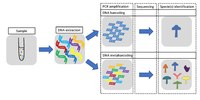
Seasonal variability in a nascent population of a non-indigenous colonial ascidian (Didemnum vexillum) near Winchester Bay, Oregon
Sign Up to like & getrecommendations! Published in 2020 at "Aquatic Ecology"
DOI: 10.1007/s10452-020-09774-w
Abstract: The non-indigenous colonial tunicate Didemnum vexillum plagues many shellfish aquaculture operations around the world by smothering crop and gear and displacing juvenile bivalves. There are two populations of D. vexillum in Oregon, but little is… read more here.
Keywords: didemnum vexillum; non indigenous; indigenous colonial; population ... See more keywords

Genetic diversity and relatedness in aquaculture and marina populations of the invasive tunicate Didemnum vexillum in the British Isles
Sign Up to like & getrecommendations! Published in 2021 at "Biological Invasions"
DOI: 10.1007/s10530-021-02615-3
Abstract: Introductions of invasive, non-native species in the marine environment are increasing as human activity within coastal areas rises. Genetic datasets are useful tools to identify source populations, track routes of invasions, and illuminate the role… read more here.
Keywords: genetic diversity; aquaculture; didemnum vexillum; vexillum ... See more keywords

Effect of substrate deployment timing and reproductive strategy on patterns in invasiveness of the colonial ascidian Didemnum vexillum.
Sign Up to like & getrecommendations! Published in 2018 at "Marine environmental research"
DOI: 10.1016/j.marenvres.2018.08.006
Abstract: The colonial ascidian Didemnum vexillum is a high-profile marine invader, with a geographically widespread distribution after introductions to several temperate regions. D. vexillum has been the focus of several eradication and control programmes globally and… read more here.
Keywords: ascidian didemnum; deployment; colonial ascidian; didemnum vexillum ... See more keywords

The Genome of the “Sea Vomit” Didemnum vexillum
Sign Up to like & getrecommendations! Published in 2021 at "Life"
DOI: 10.3390/life11121377
Abstract: Tunicates are the sister group of vertebrates and thus occupy a key position for investigations into vertebrate innovations as well as into the consequences of the vertebrate-specific genome duplications. Nevertheless, tunicate genomes have not been… read more here.
Keywords: sea vomit; didemnum vexillum; sea;